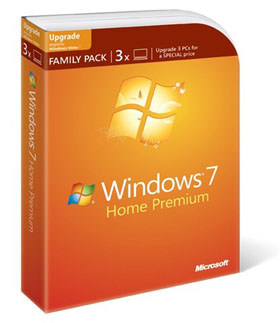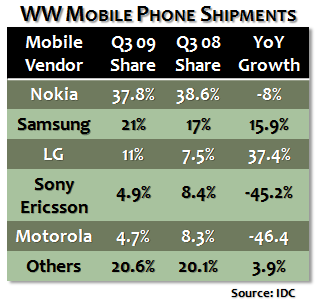
Exchange Server 2010 goes live, will extend rights-managed e-mail to browsers
One of the more important features of Microsoft Exchange Server 2010 (or Exchange 2010, depending upon whom you're talking to), officially launched for sale this morning during a TechEd conference in Berlin, is a system for mail administrators to implement policy-driven rights management that's ensured not just for Outlook 2010 (Office) users, but also users of the Outlook Web App running through Web browsers, including Mozilla Firefox and Apple Safari.
These rights management features, called Transport Protection Rules, will enable admins to generate extensive rules that restrict, where necessary, an e-mail recipient's ability to make alternate uses of the content of e-mail, including simply copying and pasting its text elsewhere, if messages are deemed confidential. Corporate Vice President Stephen Elop and Exchange product manager Julie White demonstrated TPR to a TechEd crowd that appeared, at least from the live feed from Berlin, to be less-than-capacity, though which Microsoft described as a sellout crowd of 7,000.

Google Chrome 4: Yes, it's fast, but is it usable?
If, as Google says, a Web browser is not so much an application but a platform upon which a new class of applications may be built, then that platform must provide support. It needs to give its users the ability to accomplish tasks, and to devise new and better ways to accomplish them better. For as we all know now, "browser" is an inappropriate word for the thing we use to communicate with the Web using HTTP, because the Web is becoming a space for everyday applications deployment. Especially in the content industry, active work takes place within the browser, much more so than passive amusement.
To that end, a browser may serve either as a springboard or a plank.
Despite Google Chrome's achievements, the crucial element of support remains missing. For all the spotlight we've given Chrome for being the fastest Web browser on Windows, it does not yet serve the purpose of supporting users and helping them to make their online tasks more efficient. This is why Google's expert tuning of its V8 JavaScript engine for Chrome is so important, because the browser has truly evolved into a JavaScript platform rather than an HTML platform.

Myka announces its latest Linux-based 'net top box'
Early in the summer, IPTV startup Myka delivered an impressive Linux-based device which was not quite a set-top box and not quite a home theater PC (HTPC). Though the device's identity was sort of nebulous, the company's goal was crystal clear: to easily make the tons of different types of Internet video content viewable on the TV.
This week, the company has announced its second device, the Myka ION, which pushes itself up against the HTPC category. Because it's equipped with a 1.6 GHz dual core Intel Atom 330 CPU, it could even be called a "net-top box."

What hath Mac wrought? A remembrance after a quarter-century
[ME's NOTE: This article was originally published on January 30, 2009, here in Betanews. I'm reprinting it today in honor of the memory of a man I refer to in this article, who was one of my early mentors in computing and in business, and who passed away last October 26: Elmer Zen "E.Z." Million, the proprietor of the original Southwest Computer Conference, later the CEO of private aircraft services company Million Air, and occasional candidate for some lofty, high Oklahoma office. He was a brilliant businessman, a true fiscal conservative who really did teach me how to run a business, through long hours in his office poring over accurately written ledgers. And he was the absolute antithesis of everything people assumed a "computer pioneer" was, but he was all of that and more. I dedicate this to E.Z.'s enduring memory.]
The reason there's a Macintosh today is not because of some brilliant flash of engineering genius, as many revisionists like to believe. It's because Apple had the audacity to make a few big mistakes first, and learn from them.

Video: Netflix on PlayStation 3
As a PlayStation 3 owner, I did not have the luxury of Netflix Instant streaming through my video game console until today. Now, with the aid of Blu-ray's BD-Live and a free Netflix disc which must remain loaded in the PS3, I now have access to an experience similar to the one Xbox Live Gold subscribers had on their 360s.
These discs shipped out to subscribers this week and started landing in mailboxes today.

Early build of Moblin 2.1 improves connectivity, but not device support
Until recently, netbooks seemed to be computers designed by a subtractive process. That is, you start with a notebook design, and you scale back on the cost by equipping it with lower-power processors, less on-board storage, smaller screens, and either open source software or truncated desktop operating systems.
There really hasn't been a powerful example of a "netbook experience" that was built from the ground up to differentiate the devices from their full-powered counterparts.

Early sales figures for Windows 7 nicely high, but do we know why?
The initial sales figures for Microsoft Windows 7 after its worldwide launch on October 22 are still being tabulated, but the early estimates sound very promising: According to industry analysis firm NPD, unit sales for Windows 7 software SKUs in the US were 234% higher -- better than triple -- the unit sales for Vista's launch, and US revenue from Win7 software sales was up 82% over Vista's launch.
But as Vista veterans will recall, that launch was botched somewhat, first by a costly delay, then by a decision to launch the product twice (first to businesses in October 2006, then to consumers in January 2007), and then by a lack of participation from partners. And there were still more reasons the Vista launch fizzled, one of which, believe it or not, included the scheduling of the launch on a Tuesday.

The iPhone's China syndrome: Sales of 5,000 and climbing
The iPhone went on sale last week in China, and it landed more or less with a thud. Cupertino's carrier partner in that country, China Unicom, announced on Tuesday that only 5,000 customers had purchased the phone thus far. At this rate, the handset may have trouble meeting sales expectations. China Unicom had pledged to sell 1 million iPhones per year.
Price could be one deterrent -- the iPhone starts at around the equivalent of USD$730. Add in monthly subscriber fees, and you're soon looking at a rather pricey phone in a country where the average income of urban workers in 2008 was less than $4,300.

New European counterpart to FCC will ensure 'a more neutral net'
During one of the more noteworthy weeks in Europe's modern history, as the 27 member nations of the European Union prepare for a newer and more centralized executive authority, the EU will also be making way for a powerful regulatory authority for telecommunications: the Body of European Regulators for Electronic Communications (BEREC). This is the name for the new European Telecoms Authority; and whereas in the US, there remains considerable debate over whether the Federal Communications Commission can and should have regulatory authority over Internet transactions, in Europe, the debate has officially been settled: BEREC will have authority to propose regulations for telecommunications in all forms, including the Internet.
But the power for approving, exercising, and then administering those regulations has been delegated to the European Commission. So although the new telecoms authority will be comprised of the national telecom regulatory heads from each member nation, the EC will have the authority to overrule them. Negotiations over this single provision extended for hours and eventually days, according to the EC, with the central point of contention being this and only this provision.

Verizon Wireless launches new Android, Chocolate, and ruggedized phones
In New York City today, Verizon Wireless rolled out new additions to its expanding Android and LG Chocolate phone families, while also delivering sneak previews of a new, consumer-friendly ruggedized phone called the Casio G'zOne Brigade (shown above).
Like its previously announced top-of-the-line Android phone, known simply as the Droid, the less expensive Droid Eris will be available for the first time in Verizon stores tomorrow -- which is also when pricing will be revealed.

Sophos study suggests Windows 7 UAC's default setting is self-defeating
A blog post Tuesday by Sophos senior security engineer Chester Wisniewski stated that recent Sophos tests revealed that User Account Control -- the part of Windows that prompts the user for permission before granting elevated privileges -- was ineffective in stopping common samples of malware from running, in a Windows 7-based system without virus protection.
Whereas two of the ten chosen malware samples for the test would not run in Win7 without UAC turned on at all, only one more sample (a low-prevalence worm code-named W32/Autorun-ATK) was thwarted by UAC. The other seven ran as though they were being blocked only by a stack of dominoes.

Indiscreet tweet trips awareness of Web SSL vulnerability
Internet security engineers who had been meeting secretly to discuss a possible extension to Transport Layer Security (TLS) to thwart a possible low-level exploit, were compelled yesterday to reveal the existence of their meetings after another security engineer unconnected to their project went public with a conceptual framework of the very type of exploit they were working to pre-emptively patch.
The problem is essentially a repeat of what developers of TLS and its parent protocol, Secure Sockets Layer (SSL), have dealt with a handful of times in the past: the potential of man-in-the-middle attacks by malicious servers that can pass themselves off as security authenticators. As the team from wireless security service provider PhoneFactor discovered last August, it was possible using both Microsoft IIS 7.0 and Apache httpd Web servers to demonstrate a situation where a false TLS server authenticates itself to a genuine Web client, then authenticates itself to a genuine TLS server, effectively setting itself up as a go-between that's privy to the complete contents of what appears to the innocent client to be a fully encrypted SSL session.

BlackBerry shipments grew five times faster than iPhone in Q3
Despite last week's blog and news assertions that iPhone market share had reached 30 percent or even 40 percent, today IDC put Apple's smartphone smack in its place: No. 3, with 17.1 percent worldwide smartphone market share during third quarter. A year earlier, Apple ranked ahead of Research in Motion, which has reclaimed second spot, behind Nokia.
Manufacturers shipped 43.3 million smartphones during third quarter, up 3.2 percent from 41.9 million units in second quarter and up 4.2 percent from 41.5 million units in third quarter 2008. More broadly, manufacturers shipped 287.1 million handsets, up 5.6 percent year over year, according to IDC.

How RIM can avoid a premature endgame for BlackBerry
Once not so long ago, if you wanted bulletproof e-mail on a mobile device, you bought a BlackBerry. Research In Motion, the company that practically defined wireless messaging a decade ago, has done quite nicely for itself since then, garnering over 56% of the market for smartphones in the US and about 20% of the overall wireless handset market that includes smartphones as well as conventional feature phones. Its end-to-end encryption and still-unique service paradigm that routes messaging traffic through secure Network Operations Centers further endeared the platform to enterprise buyers, even as the company was successfully pushing the franchise into the consumer space.
Unfortunately for RIM, nothing stays the same in the increasingly competitive wireless market. The BlackBerry is no longer a market of one, and many of the features that defined the platform -- including push e-mail and enterprise-class security -- are no longer unique. Worse, the critical feature set for a modern smartphone has expanded to include rich Web access, broad application availability, and an integrated, Web services-aware operating system. It's no secret that the BlackBerry platform lags in all of these areas with its fine-for-the-1990s browser, relatively paltry app ecosystem, and an OS that despite regular incremental updates still betrays its decade-old roots.

Is AES encryption crackable?
In the field of computer technology, some topics are so frequently and fiercely disputed that they almost resemble religious feuds -- Mac vs. PC, for instance, or open source vs. proprietary software.
Other topics, though, don't see nearly the same level of high-profile debate. Take the invulnerability of the Advanced Encryption Standard (AES) encryption, for example. Governments and businesses place a great deal of faith in the belief that AES is so secure that its security key can never be broken. However, a team of researchers from Germany, France and Israel has recently demonstrated what may be an inherent flaw in AES -- theoretically, at least.



